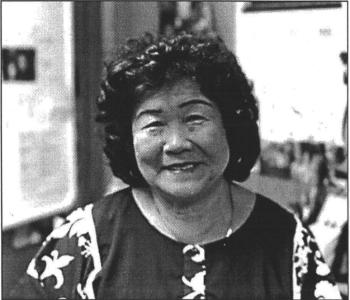Sadako Suzuki

Tsunamis Remembered: Oral Histories of Survivors and Observers in Hawai‘i
Life history interviews with individuals who witnessed and survived tsunamis-particularly the 1946 and 1960 disasters on the Big Island of Hawai'i. Thirty individuals-mostly residents of Hilo and Laupahoehoe-recall their experiences before; during, and after the 1946 and 1960 tsunamis which were arguably the most destructive natural disasters in modem Hawaiian history.
Sadako Ishizaki Suzuki was born August 29, 1929 in North Kohala, Hawai'i. Her father, Sahichi Ishizaki, was an immigrant to Hawai'i from Japan and was employed by Kohala Sugar Company. Her mother, Itoyo Takatani Ishizaki, was born and raised in North Kohala. When Suzuki was eight years old, she, her older sister, and two younger brothers were orphaned. The children were taken in by a Daikawa family in Hilo and eventually came to live in the Waiak:ea district of the town. Suzuki, from the age of ten, did household work for different Hilo families. Suzuki attended Waiakea Kai Elementary, Hilo Intermediate, and Hilo High schools. While still a junior in high school, she began working for the Suzuki family, who owned a small vegetable and fruit store in Waiakea. Suzuki remembers packing produce for shipment to Honolulu and performing clerical duties. Suzuki married Henry Suzuki, a son of the business' owners, in 1951. The 1960 tsunami completely destroyed their place of business and its contents. Two members of the Suzuki family were killed. Determined to continue, Suzuki and her family ran the business from their home. Eventually, with help from the Hawai'i Redevelopment Authority which was established to aid individuals and businesses displaced by the 1960 tsunami, the business relocated to its present location in the Hilo industrial area. Suzuki, her husband, and three of their four children continue to operate the business, Hilo Products, Inc., a wholesale produce company.
Scope and Content Note
A woman, orphaned at an early age, remembers her parents, adoption by a Waiakea family, childhood jobs, and schooling. She relates the background of Hilo Products and her marriage to a son of the owners. Also discussed are effects of the 1946 tsunami on the business and terrible cost of the 1960 tsunami which killed three of her in-laws and destroyed the store building.
Program Note:
This interview is part of the Center for Oral History's project Tsunamis Remembered: Oral Histories of Survivors and Observers in Hawai‘i. Interviews from this project are available in the Center's ScholarSpace open access repository.
The Center for Oral History (COH), in the Department of Ethnic Studies at the University of Hawaiʻi at Mānoa, collects, documents, preserves and highlights the recollections of Native Hawaiians and the multi-ethnic people of Hawaiʻi. It produces oral histories and interpretive historical materials about lifeways, key historic events, social movements and Hawaiʻi’s role in the globalizing world, for the widest possible use.
Please Note: The oral histories in this collection are protected by copyright and have been created for educational, research and personal use as described by the Fair Use Doctrine in the U.S. Copyright law. Please reach out Voices@noaa.gov to let us know how these interviews are being used in your research, project, exhibit, etc. The Voices staff can help provide other useful resources related to your inquiry.
The NOAA mission is to understand and predict changes in climate, weather, oceans, and coasts, to share that knowledge and information with others, and to conserve and manage coastal and marine ecosystems and resources. The Voices Oral History Archives offers public access to a wide range of accounts, including historical materials that are products of their particular times, and may contain offensive language or negative stereotypes.
Voices Oral History Archives does not verify the accuracy of materials submitted to us. The opinions expressed in the interviews are those of the interviewee only. The interviews here have been made available to the public only after the interviewer has confirmed that they have obtained consent.
